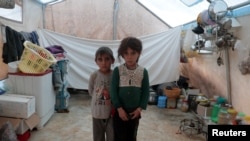Russia and China vetoed a U.N. Security Council resolution Tuesday, potentially shutting down a six-year-old cross-border aid operation that assists millions of Syrian civilians in the northwestern part of the country.
“This is not yet over,” said Belgium’s U.N. Ambassador Marc Pecsteen de Buytswerve, who along with Germany drafted and guided council negotiations on the failed resolution. “We will in the coming hours and days engage in efforts with all parties to come to consensus. This is an important responsibility of the council. We hope we can find unity in the interest of the Syrian people in need.”
The existing resolution authorizing aid convoys from Turkey into northwestern Syria will expire on July 10, so there is potentially time for the 15-nation council to try to reach some sort of compromise that would keep the aid flowing.
In January, the council bowed to pressure from Russia and China and closed two of four existing crossing points, rather than risk losing the entire cross-border aid operation to their vetoes. One of the closed crossings was used for medical supplies coming from Iraq into northeast Syria, and the other was between Syria and Jordan that had not been in recent use.
COVID-19
Although the United Nations and aid groups wanted the crossing from Iraq reinstated to assist with the COVID-19 response, diplomats did not press for it because they felt it would sour any chance of convincing Russia to keep the two existing border crossings. Ultimately, that strategy failed.
Syria has registered 372 cases of COVID-19, the disease caused by the new coronavirus, and 14 deaths. Testing has not been widely implemented, and there are fears the virus could spread rapidly among a population that is hungry and lacking adequate medical care.
In addition to COVID-19, Syria is facing its worst financial crisis of its nine-year conflict. The currency is in free-fall, commodity prices are skyrocketing, and many Syrians are struggling to afford food.
Russia
Russia has argued that the aid operation was only supposed to be temporary and that the situation has changed on the ground, no longer necessitating it. The Russian envoy said Moscow is willing to accept continuation of only one border crossing — Bab al-Hawa — but other council members and the U.N. aid organizations say that is inadequate.
“The cross-border in Idlib will remain and will continue,” Vassily Nebenzia told council members, if they adopt a draft resolution put forward by Moscow. The result of that vote is expected Wednesday evening.
China
China, which has a close alliance with Russia on the Security Council, also vetoed the draft resolution. Diplomats said they had raised the possibility of sanctions relief for Syria in negotiations, and the ambassador raised it publicly after the results of the vote.
“Without lifting those coercive measures, whatever we do, we will not be able to solve the problem in a holistic way,” Ambassador Zhang Jun said, referring to sanctions. “We reject those blames from the United States. It’s once again demonstrating the hypocritical approach adopted by this country, while they are imposing unilateral sanctions killing the Syrians and criticizing the process of the Security Council.”
US sanctions
Last month, the U.S. imposed new sanctions that target financial backers and other bad actors who support the regime of Syrian President Bashar al-Assad.
“Unilateral sanctions from the United States have humanitarian exceptions and humanitarian exemptions, and they in no way harm the people of Syria,” said U.S. political coordinator Rodney Hunter. “The only person, the only thing, that is harming the people of Syria and preventing them from getting the assistance that they need is the Assad regime, being helped out by the People's Republic of China and the Russian Federation.”
Hunter also criticized the two powers for vetoing the draft resolution, saying it was a “cynical attempt” to put politics “above the lives of the Syrian people.”
The U.N.’s humanitarian chief, Mark Lowcock, told the council last month that cross-border aid is a lifeline for millions of civilians in northwest Syria whom they could not reach otherwise. He said cross-line deliveries cannot substitute for the cross-border operation, and he appealed to the council to keep the operation going and reinstate the Iraqi crossing.
In April and May, the United Nations said it reached some 1.3 million people through its aid operation from Turkey.
“With 2.8 million people in need, and 2.7 million internally displaced people, needs for those in northwest Syria remain incredibly high,” U.N. spokesman Stephane Dujarric said this week. “We have significantly increased the aid delivered via cross-border operations into the area, but much more is needed.”




